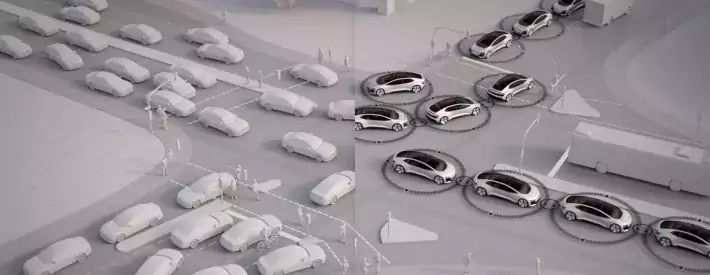How Nissan is helping drive the UK towards an autonomous future

Self-driving is being taken up a gear in the UK as the government-backed evolvAD project brings in a new partner, pushing the country ahead as autonomous functionality becomes a bigger part of automotive.
In collaboration with consortium partners Connected Places Catapult, Humanising Autonomy, SBD Automotive and TRL, the project will use 100% electric Nissan Leaf cars equipped with autonomous drive (AD) technology to study self-driving in urban residential and rural roads.
David Moss, Senior Vice-President, Region Research and Development for Nissan AMIEO (Africa, Middle East, India, Europe, and Oceania), said: “We are extremely proud to be a part of the evolvAD project in the UK. Through Nissan Ambition 2030 we want to empower mobility for everyone, and AD technologies are critical to this effort as they offer huge benefits in terms of vehicle safety, environmental impact and accessibility.”
Robert Bateman, evolvAD Project Manager at Nissan Technical Centre Europe, in Cranfield, added: “Since 2017, we've been working for a group in Japan on autonomous vehicles. The first project was HumanDrive, which mainly involved motorway driving. As part of that, in 2019, we did The Grand Drive, still the longest self-driving journey in the UK, around 230 miles from Cranfield to Sunderland.
“Then we did ServCity in Greenwich, using the Smart Mobility Living Lab, the UK government's CAM testbed in London. That was a significant progression – driving on arterial roads, dealing with more roadside furniture and a lot more pedestrians.
“Another aspect was having infrastructure communicating with the car. For example, getting an input regarding a bus at a standstill around the next corner – our car changed lanes in readiness before anybody else on the road even knew it was there!
“Having done highway and city centre driving, the logical next step was the last miles – getting from a rural village onto a motorway, or navigating a small urban side street. That’s the purpose of evolvAD, to bookend the first two projects.
The project involves residential streets, speed bumps, mini-roundabouts, width restrictions and, most importantly, dealing with traffic coming in the opposite direction. One of the issues with autonomous vehicles is, because of their safe nature, they will wait. Two connected and autonomous vehicles coming towards each other is fine – they’ll communicate and give way seamlessly. That might not be the case with human driven cars – it’s an area the project will help shed light on.
Bateman said: “Other more challenging scenarios are rural lanes with extreme cambers and blind bends. There’s a risk that an autonomous vehicle might drive too slowly, to the extent that it becomes a hazard by frustrating the human drivers. Our solution is for the car to behave like a safe local driver.
“We also test in the US and Japan, but there are features specific to the UK which are harder to handle than the wide roads and bright sunshine of Silicon Valley. They don’t have things like unsynchronized pedestrian crossings. Our colleagues were initially quite shocked when they saw pedestrians dashing out in front of cars – people just don’t do that in Yokohama! Nissan realised the UK was the best place to test.
The evolvAD project will be a 21-month project, running to March 2025, with the country road work conducted at Millbrook. It’s very impressive the sort of speeds the vehicle can safely reach there now. It involves multiple autonomous systems, and some will mature more quickly than others.
“My team has grown considerably over the last six years. Before HumanDrive, we had one full-time engineer. Now, we’ve got a group of research engineers, technicians and highly qualified test drivers. We’re responsible for procuring the hardware, developing the software and maintaining the vehicles. It also involves bringing through the next generation of engineers and technicians,” said Bateman.
The evolvAD project will further enhance autonomous drive technology, a key pillar of the Nissan Ambition 2030 vision to create a cleaner, safer and more inclusive world. And it also pushes the UK’s position as a leader in these systems that little further forward, bringing the technology a step closer to the mainstream.

